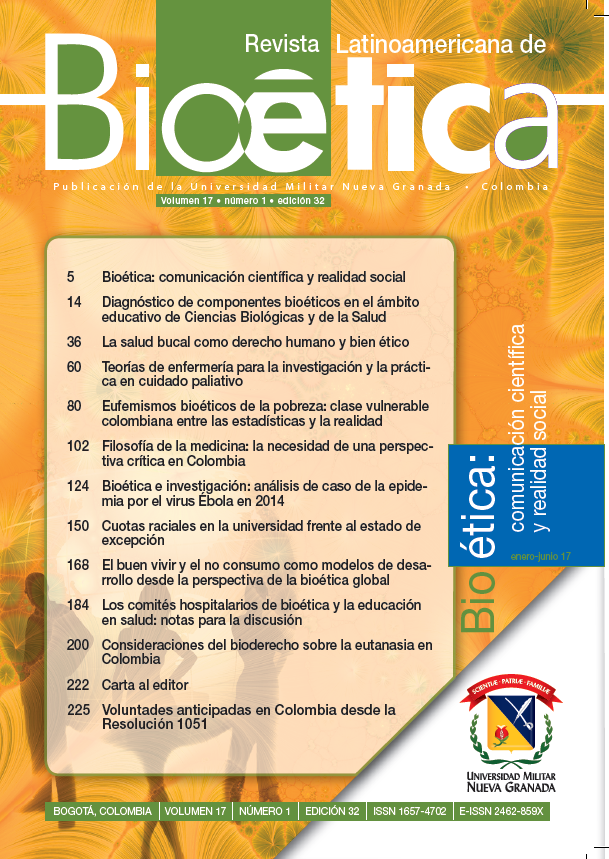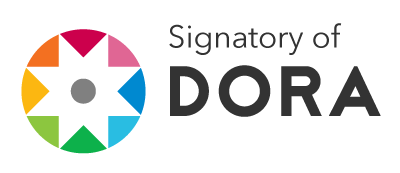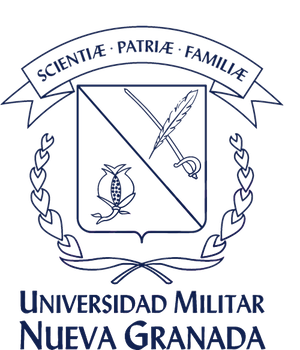The Philosophy of Medicine, the need for a critical perspective in Colombia
Abstract
Philosophy of Medicine is an interesting field of study concerned with issues and problems that are philosophically relevant in practice and research in Medicine. However, although Philosophy of Medicine enjoys recognition in other latitudes, in Colombia it has received little attention, in particular, because of the rise of bioethics, which has overshadowed other kinds of reflections on the medical task. In this paper, departing from an overview about the formation of the field, it is argued that a Critical Philosophy of Medicine should be promoted as a deep and critical reflection on the genesis and possible way outs to the crisis that the healthcare system and the medical profession have experienced in Colombia in the last two decades. A Critical Philosophy of Medicine must then contribute to training physicians and health professionals to be able to transform the ethos of their professions as well as of the health care services.
Downloads
References
Ardila, A. (agosto-diciembre, 2012). Dilemas médicos: una forma de expresión del capitalismo. Anamnesis, (7), 16-22.
Ardila, A. (2016). Neoliberalismo y trabajo médico en el Sistema General de Seguridad Social en Salud. De la profesión liberal al trabajo explotado (Tesis doctoral). Universidad Nacional de Colombia, Bogotá.
Beauchamp, T. y Childress, J. (2009). Principles of biomedical ethics (6ta. Ed.). Nueva York: Oxford University Press.
Revista Mensual (1935). Boletín Clínico, II(2), 60.
Conrad, P. (2007). The medicalization of society: on the transformation of human conditions into treatable disorders. Baltimore: Johns Hopkins University Press.
Cortina, A. (1997). El mundo de los valores "ética mínima" y educación. Bogotá: El Búho.
Chamberlian, J. (2010). Governing Medicine: Medical Autonomy in the United Kingdom and the Restratification Thesis. EA -Revista de Humanides Médicas & Estudios Sociales de la Ciencia y la Tecnología, 1(3), 1-16. Recuperado el 28 de mayo de 2012, de http://www.ea-journal.com/es/numeros-anteriores/59-vol-1-n-3-abril2010/199-indice-de-contenidos-vol-1-no-3-abril-2010
DeVries, R. y Conrad, P. (1998). Why bioethics needs sociology. En R. DeVries y J. Subedi (Eds.), Bioethics and society. Constructing the ethical enterprise (pp. 233-257). Upper Saddle River: Prentice Hall.
Díaz Amado, E. (2002). La crisis del paradigma anatomo-clínico: de las metáforas de la enfermedad. En G. Cely (Ed.). Dilemas Bioéticos Contemporáneos (pp. 99-115). Bogotá: 3R.
Díaz Amado, E. (2007). Crítica a la Bioética si ha de ser instrumento para la construcción de paz en Colombia. Revista Latinoamericana de Bioética, 7(12), 92-101.
Díaz Amado, E. (diciembre, 2008). La arrogancia médica se cura con poesía. Anamnesis, (2), 8-12.
Díaz Amado, E. (2009). Medicina, biotecnopolítica y bioética: de la anatomía a la autonomía. EA -Revista de Humanides Médicas & Estudios Sociales de la Ciencia y la Tecnología, 1(2), 1-35. Recuperado el 28 de mayo de 2012, de http://www.ea-journal.com/es/numeros-anteriores/58-vol-1-n-2/161-indice-vol1-n2
Díaz Amado, E. (enero-julio, 2013). Los discursos de la bioética en Colombia. Anamnesis, (8), 15-27
Emmanuel, E. y Emmanuel, L. (1992). Four models of the physician-patientrRelationship. JAMA, 267(16), 2221-2226. https://doi.org/10.1001/jama.1992.03480160079038
Engelhardt, D. V. (enero-marzo, 2000). La ética médica en su perspectiva histórica. Labor Hospitalaria, XXXII(255), 2000.
Engelhardt, H. T. (1995). Los fundamentos de la Bioética. Barcelona: Paidós.
Engelhardt, H. T. (2000). The philosophy of medicine and bioethics: An introduction to the framing of a Field. En H. T. Engelhardt (Ed.), The Philosophy of Medicine. Framing the Field (pp. 1-15). Dordrecht: Kluwer.
Escobar Melo, H.; Díaz Amado, E.; Páramo Cely, L.; Suárez Obando, F. y León Guevara, C. (2010). Caracterización del razonamiento moral en la práctica clínica en relación con el proceso de formación médica en una Facultad de Medicina, categoría altruismo y dignidad, beneficencia, confidencialidad y deber de cuidado. Revista Colombiana de Bioética, 5(1), 34-56.
Escobar Melo, H. y Díaz Amado, E. (2010) Dilema morales y práctica clínica. Reflexiones a partir de un estudio de campo. Bogotá: Iberoamericana.
Faden, R. y Beauchamp, T. (1986). A History and Theory of Informed Consent. Nueva York: Oxford University Press.
Feyerabend, P. (2001). ¿Por qué no Platón? Madrid: Tecnos.
Foucault, M. (1989). El nacimiento de la clínica. Una arqueología de la mirada médica. México, D. F.: Siglo XXI.
Foucault, M. (1996). Vigilar y castigar. Nacimiento de la prisión. México, D. F: Siglo XXI.
Foucault, M. (1998). The will to knowledge. The history of sexuality. London: Penguin.
Foucault, M. (2006). Seguridad, territorio, población. Buenos Aires: Fondo de Cultura Económica.
Fox, E. (1999). Rethinking Doctor Think: Reforming Medical Education by Nurturing Neglected Goals. En M. Hanson y Callahan (Eds.), The Goals of Medicine (pp. 181-197). Washington: Georgetown University Press.
Fox, R., Swazey, J. y Watkins, J. (2008). Observing bioethics. Oxford, New York: Oxford University Press. https://doi.org/10.1093/acprof:oso/9780195365559.001.0001
Garrafa, V. y Porto, D. (2003). Intervention bioethics: A proposal for peripheral countries in a context of power and injustice. Bioethics, 17(5-6), 399-416. https://doi.org/10.1111/1467-8519.00356
Ten Have, H. (2000). Bodies of knowledge, philosophical anthropology, and philosophy of medicine. Philosophy and Medicine, 64, 19-36. https://doi.org/10.1007/0-306-47475-1_2
Hegel, G. W. F. (1955). Filosofía del Derecho. Buenos Aires: Claridad.
Hellemeyer, A. y Díaz Amado, E. (2015). Entre ética y derecho: tensiones en el campo biomédico a propósito del respeto de la autonomía. En R. Andorno y V. Ivonne (Eds.), Casos de bioética y derecho (pp. 64-74). Valencia: Tirant lo Blanch.
Heller, A. (1995). Biopolítica, la modernidad y la liberación del cuerpo. Barcelona: Península. (2009). Educación para un nuevo humanismo. Magis, 2, 425-433.
Hoyos, G. (enero-junio, 2012). Sociedad, política y bioética. ¿Cómo debe salvar la filosofía a la bioética en Latinoamérica? Anamnesis, (6), 34-42.
Jaeger, W. (1992). Paideia. Los ideales de la cultura griega. Bogotá: Fondo de Cultura Económica.
Jacoby, H (Ed.) (2009). House and philosophy. Everybody lies. Hoboken: Wiley.
Jonsen, A. R. (1992). The new medicine and the old ethics. Cambridge: Harvard University Press.
Kant, I. (2004). ¿Qué es la ilustración? y otros escritos de ética, política y filosofía de la historia. Madrid: Alianza.
Lupton, D. (2003). Medicine as culture: Illness, disease and the body in western societies. London: SAGE.
Marcum, J. (2010). An introductory philosophy of medicine. Humanizing modern medicine. Texas: Springer.
Marx, K. (1967). El capital. Barcelona: Orbis.
Marx, K. y Engels, F. (1997). Manifiesto del Partido Comunista. Bogotá: Panamericana.
Ministerio de Salud y Protección Social (26 de julio de 2016). Nuevos pasos para la transformación de la educación médica. Ministerio de Salud y Protección Social. Recuperado el 6 de octubre de 2016, de https://www.minsalud.gov.co/Paginas/Nuevos-pasos-para-la-transformacion-de-la-educacion-medica.aspx
Morreim, E. H. (2001). Holding health care accountable: law and the new medical marketplace. Oxford: Oxford University Press.
Nussbaum, M. (2010). Not for profit. Why democracy needs the humanities. New Jersey: Princeton University Press.
Otero Ruiz, E. (2004). Palabras del Dr. Efraím Otero Ruiz, presidente del Tribunal Nacional de Ética Médica, durante la celebración de los diez a-os del Tribunal de Ética Médica de Risaralda y Quindío. Gaceta del Tribunal Nacional de Ética Médica, 8(1), 7-11.
Pellegrino, E. (1998). What philosophy of medicine is. Theoretical Medicine and Bioethics, 19, 315-336. https://doi.org/10.1023/A:1009926629039
Pellegrino, E. y Thomasma, D. (1981) A philosophical basis of medical practice. Towards a philosophy and ethic of the healing professions. New York: Oxford University Press.
Pe-a, G. (25 de febrero de 2001). A dónde va el dinero de la salud. El Tiempo. Recuperado el 18 de mayo de 2016, de http://www.eltiempo.com/archivo/documento/MAM-604245
Platón (2002). Las leyes. Madrid: Alianza.
Porter, M. y Teisberg, E. (2007). How physicians can change the future of health care. JAMA, 297, 1103-1111. https://doi.org/10.1001/jama.297.10.1103
Porter, R. (2002). Breve historia de la medicina. De la Antigüedad hasta nuestros días. Bogotá: Taurus.
Potter, V. R. (1971). Bioethics bridge to the future. Englewood Cliffs: Prentice-Hall.
Relman, A. (1990). The new medical-industrial complex. En P. Conrad y R. Kern (Eds.), The sociology of health and illness: critical perspectives (3ra. Ed., pp. 209-217). Nueva York: St. Martin's Press.
Rose, N. (2007). The politics of life itself: biomedicine, power, and subjectivity in the twenty-first century. Princeton: Princeton University Press. https://doi.org/10.1515/9781400827503
Rose, N. (1999). Governing the soul: the shaping of the private self. London: Free Association Books.
Rueda, E., Hoyos, G., Suárez, E., Casta-eda, N. et al. (2010). La violencia estructural en el sistema de salud colombiano como problema ético: bases de un programa de investigación. En Violencia, bioética y salud pública (pp. 69-90). Bogotá: Ministerio de la Protección Social y Fondo de Población de las Naciones Unidas.
Sadegh-Zadeh, K. (2012). Handbook of analytic philosophy of medicine. Dordrecht: Springer. https://doi.org/10.1007/978-94-007-2260-6
Seligman, M. (1981). Indefensión en la depresión, el desarrollo y la muerte. Madrid: Debate.
Semberoiz, A. (2012). El momento ético. Sensibilidad moral y educación médica. Buenos Aires: Biblos.
Sigerist, H. (1974). Historia y sociología de la medicina. Bogotá: Guadalupe.
Starr, P. (1982). The social transformation of American medicine. Nueva York: Basic Books.
Stempsey, W. (2008). Philosophy of medicine is what philosophers of medicine do. Perspectives in Biology and Medicine, 51(3), 379-391. https://doi.org/10.1353/pbm.0.0021
Suárez Obando, F. y Díaz Amado, E. (2007). La formación ética de los estudiantes de medicina: la brecha entre el currículo formal y el currículo oculto. Acta Bioethica, 13, 107-113. https://doi.org/10.4067/S1726-569X2007000100011
Unschuld, P. (2009). What is medicine? Western and eastern approaches to healing. Los Ángeles: University of California Press. https://doi.org/10.1525/california/9780520257658.001.0001











